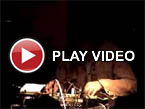Arthur Russell, "First Thought Best Thought"
 Yet another posthumous Arthur Russell release from Audika, this two-disc set collects rare and unreleased orchestral material by the late NYC artist. Because the material presented here is, at least ostensibly, the most "avant-garde" in form and content yet released from the Russell archives, I expected the music to be difficult, abstract and academic. However, nothing could be further from the truth, as Russell again utilizes avant-garde techniques only as a method of approaching popular music obliquely, creating music that is as ingratiating as it is unique.
Yet another posthumous Arthur Russell release from Audika, this two-disc set collects rare and unreleased orchestral material by the late NYC artist. Because the material presented here is, at least ostensibly, the most "avant-garde" in form and content yet released from the Russell archives, I expected the music to be difficult, abstract and academic. However, nothing could be further from the truth, as Russell again utilizes avant-garde techniques only as a method of approaching popular music obliquely, creating music that is as ingratiating as it is unique.I find it strange that Arthur Russell has been claimed by the intellectual beard-stroking crowd that characterizes the staff and readership of pubs such as The Wire, because Russell produced at least as much music that was unashamedly pop as that which could be considered "avant-garde" in his lifetime, probably more. Although he was associated with The Manhattan School of Music and "serious" composers such as Philip Glass, he seemed to spend most of him time merging these more academic techniques with the music that he loved—disco, symphonic pop and new wave. Almost all of the music that Russell recorded falls somewhere in the middle of the number line where the strict modern classical avant-garde approach is the rightmost point, and the unabashedly populist spirit is the lefmost extreme.
The 15 excerpts that comprise Instrumentals Vols. 1 & 2, which take up most of disc one, are no exception. Although these pieces were created through semi-composed, semi-improvised sessions including some of NYC's biggest downtown art music heavyweights (Rhys Chatham, Jon Gibson, Peter Zummo, etc.), and were originally intended as site-specific mixed-media compositions to accompany photographic wall projections by artist Yuko Nonomura, the music itself is anything but abstract or difficult. In fact, it sounds like a breath of fresh air. A beautiful spontaneous outpouring of all of the most bright, saccharine symphonic gestures. It sounds not unlike the lush musical backdrops created by Brian Wilson and his session musicians for Pet Sounds and SMiLE, vibrant orchestral compositions that effortlessly combine Gershwin's Americana with the teenage symphonies of Phil Spector. Russell's midwestern background informs this music, much of it alive with the wonder of frontier America, with cascading melodies and flourishes that feel resplendent and celebratory. Russell himself, in the included notes, seems to dismiss the idea that these pieces are meant to be avant-garde: "My desire was to simulate the popular radio sound...I feel it demonstrates a movement and sequence that hints at the popular radio sound of the future."
These 15 tracks are excerpts from much longer improvisations, each especially chosen and sequenced by Russell, though only Instrumentals Vol. 2 was ever released during his lifetime (on Belgium's legendary Les Disques Du Crepuscule label in 1984), and in a very limited LP run that was incorrectly mastered. Because these are excerpts, the music often unceremoniously fades out in the midst of an interesting groove, and though I am sure this was done this for a very good reason, it might be interesting to hear an unexpurgated session. Considering the fact that these are live performances from 1975-77, the tapes have held up remarkably well, and the recordings are beautifully crisp, with each instrument audible in the mix. Appended to disc one is a piece entitled "Reach One," composed for two Fender Rhodes (guitar and piano), recorded in 1975. Comprising nearly 17 minutes of ambient meandering, its the most experimental moment across these two discs, but is nonetheless approachable on its own terms, as an evocative, if minimal, amelodic excursion mapping the face of a distant moon.
Tower of Meaning is not as immediately seductive and listenable as Instrumentals, a seven-movement piece composed by Russell and conducted by Julian Eastman in 1981. It was released in a tiny edition in 1983 and has been out of print ever since. Austere strings and horns create an overwhelming sense of gravity, an elegiac feeling that pulls slowly along like a tugboat down the East River. More than anything else Russell recorded, Tower of Meaning sounds like what is usually suggested by the term "modern classical," a serious composition using a classic instrumental palette. However, there are moments when Russell approaches the pastoral Americana feel of Instrumentals, for instance when the delicate fingerpicked violin melody emerges on track four, or when percussive elements appear in the final, sidelong movement, tying together all of the themes introduced in the first six segments. All in all, its a fascinating piece that rewards repeat listenings, but will no doubt seem alienating to someone checking out Russell because they heard "You and Me Both" on college radio.
Rounding out the second disc is a 10-minute piece called "Sketch for the Face of Helen," a previously unreleased piece by Russell performed entirely on a keyboard and tone generator. Without his beloved cello at his side, Russell is out of his comfort zone, but he still ends up producing an expressive and mesmerizing piece, using the squishy, alien tones of the synthesizer to create a hypnotic progression that suggests the microscopic contours of a human face as viewed through an electron microscope. First Thought, Best Thought is certainly not for the casual Arthur Russell fan, but it is vital proof of the breathtaking scope of the artists' work, and further testament to his Renaissance Man approach both to pop and avant-garde musics.
samples:



